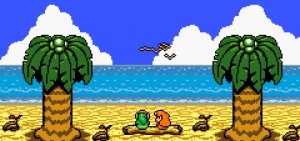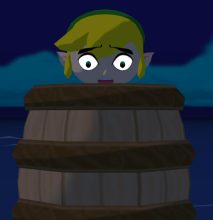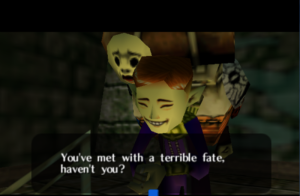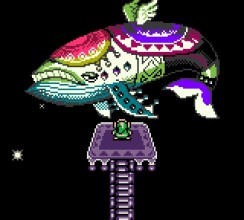Gossip Stone: Should Another Game Be Given the Same Type Of Atmosphere as Link’s Awakening?
Posted on March 14 2016 by Jon Lett
 Link’s Awakening is one of the unfortunately underplayed games in the series. In talks of which game is the greatest in the series, this Game Boy classic is mostly overshadowed by console titles. But fans should remember that it stands as a turning point in the series. As the first portable Zelda, and the first more heavily story-driven game in the series, so it acted as something for the developers to learn from. It is often seen as the series’ black sheep, but could we possibly have another game with its style of mystery and humor in its plot?
Link’s Awakening is one of the unfortunately underplayed games in the series. In talks of which game is the greatest in the series, this Game Boy classic is mostly overshadowed by console titles. But fans should remember that it stands as a turning point in the series. As the first portable Zelda, and the first more heavily story-driven game in the series, so it acted as something for the developers to learn from. It is often seen as the series’ black sheep, but could we possibly have another game with its style of mystery and humor in its plot?
Join the discussion after the jump!
 Humor is something often left a bit dry in Zelda games. The recent release of Tri Force Heroes, what with its rather… mixed reactions from fans, may have doomed a lot of potential humor that could be used in future games. This is a shame, since the series has had some golden funny moments throughout, a number of which were in Link’s Awakening. The game was meant to be cute and humorous in the overworld, contrasting with the dank and dangerous underbelly of Koholint Island’s dungeons. And really, it succeeded wonderfully. It is likely thanks to this game that the developers later felt comfortable making Link be the occasional source of comic relief. The Wind Waker, The Minish Cap and both DS titles clearly gained some points for their humour, so why not up the laughs a bit for once, making another entire overworld full of life and chuckle-worthy content? Now, again, Tri Force Heroes did this, and honestly, the characters themselves I found refreshing, but the game’s overall lack of worthy gameplay made it really fall short. Still, I think the funny side of the series is worth another shot.
Humor is something often left a bit dry in Zelda games. The recent release of Tri Force Heroes, what with its rather… mixed reactions from fans, may have doomed a lot of potential humor that could be used in future games. This is a shame, since the series has had some golden funny moments throughout, a number of which were in Link’s Awakening. The game was meant to be cute and humorous in the overworld, contrasting with the dank and dangerous underbelly of Koholint Island’s dungeons. And really, it succeeded wonderfully. It is likely thanks to this game that the developers later felt comfortable making Link be the occasional source of comic relief. The Wind Waker, The Minish Cap and both DS titles clearly gained some points for their humour, so why not up the laughs a bit for once, making another entire overworld full of life and chuckle-worthy content? Now, again, Tri Force Heroes did this, and honestly, the characters themselves I found refreshing, but the game’s overall lack of worthy gameplay made it really fall short. Still, I think the funny side of the series is worth another shot.
Something I hope for even more than humor, though, is a real air of mystery in a new Zelda. This is a quote from an old Iwata Asks discussion, regarding Link’s Awakening‘s influence taken from the 1990 serial drama Twin Peaks. Takashi Tezuka, Eiji Aonuma and Satoro Iwata were discussing a number of points in the game’s development:
“At the time, Twin Peaks was rather popular. The drama was all about a small number of characters in a small town. […] So when it came to The Legend of Zelda: Link’s Awakening, I wanted to make something that, while it would be small enough in scope to easily understand, it would have deep and distinctive characteristics.” – Takashi Tezuka
Shortly after, Aonuma commented:
“When I was reading Tanabe-san’s comments in the strategy guide, I saw, “Tezuka-san suggested we make all the characters suspicious types like in the then-popular Twin Peaks.”
 Link’s Awakening is special in that ever since its release, no other Zelda has come close to really making the player think about what is really going on around them, in terms of a suspicious and mysterious plot. Don’t get me wrong, I know that some games in the past have had a certain level of mystique to them. Majora’s Mask often throws new players off a bit with its off-putting and, honestly, creepy nature, but the player always knows exactly what is going on, and why everything in the game is as strange as it is (the evil imp and the big falling moon, in case you didn’t notice). More recently, A Link Between Worlds had a subtle underlying feeling that not everything was as it seemed. You do not know much about Hilda, or why Lorule is the way it is, and its citizens certainly make it seem like something had gone horribly wrong in that world at some point. But, again, it’s subtle. You are not really meant to feel like you have a big mystery to work through. Instead, everything is revealed by Hilda right at the end. It was great, plot-wise, but it was not what Link’s Awakening did.
Link’s Awakening is special in that ever since its release, no other Zelda has come close to really making the player think about what is really going on around them, in terms of a suspicious and mysterious plot. Don’t get me wrong, I know that some games in the past have had a certain level of mystique to them. Majora’s Mask often throws new players off a bit with its off-putting and, honestly, creepy nature, but the player always knows exactly what is going on, and why everything in the game is as strange as it is (the evil imp and the big falling moon, in case you didn’t notice). More recently, A Link Between Worlds had a subtle underlying feeling that not everything was as it seemed. You do not know much about Hilda, or why Lorule is the way it is, and its citizens certainly make it seem like something had gone horribly wrong in that world at some point. But, again, it’s subtle. You are not really meant to feel like you have a big mystery to work through. Instead, everything is revealed by Hilda right at the end. It was great, plot-wise, but it was not what Link’s Awakening did.
“TSSSK, TSSSK! You don’t ssseem to know what kind of island thisss iss… KEEE-HEEE-HEEE! What a fool…” – Slime Eel, Link’s Awakening
 For those that do not know, Twin Peaks is famous for its incredibly ability to leave the viewer with a feeling of doubt towards most, if not all of the citizens of the town of Twin Peaks, due to the underlying spiritual power the town seems to have, which influences the town itself regularly, leading to strange and horrifying experiences. In hearing this conversation from the Iwata Asks, it is clear that they want readers to see that the primary influence taken from Twin Peaks was the connections between characters, and the general setting of the game. That being said, it is very easy to see that Twin Peaks was the influence they learned from in designing the games mysterious and creepy atmosphere. Throughout the game you meet and befriend new people, growing close to some, and learning from others. Along the way, though, you also learn that something evil is afoot on the island. Not only that, but the very island itself, as well as its inhabitants, are not what they seem. Certain bosses, especially, use their dying breathes to let you know that you do not know what you are really fighting for, eventually leading you to the truth that the whole island is a dream. When I first played Link’s Awakening, these moments impressed me, as they sprang back to mind as I met new characters, and repeatedly met with Marin. The whole situation worried me, as I did not know whether the people around me were in on the big secret, or if they were innocent victims. I wish another game would have that much effort put in to create a real feeling of doubt in the player, making them question the world around them, and even to question themselves, as this game did with the potential waking of the Wind Fish, and the inevitable repercussions of doing so. Not only does it pay to subtly, but substantially, worry players all along the way, but it also helps to make players think more deeply on their adventure, and make them think about their decisions.
For those that do not know, Twin Peaks is famous for its incredibly ability to leave the viewer with a feeling of doubt towards most, if not all of the citizens of the town of Twin Peaks, due to the underlying spiritual power the town seems to have, which influences the town itself regularly, leading to strange and horrifying experiences. In hearing this conversation from the Iwata Asks, it is clear that they want readers to see that the primary influence taken from Twin Peaks was the connections between characters, and the general setting of the game. That being said, it is very easy to see that Twin Peaks was the influence they learned from in designing the games mysterious and creepy atmosphere. Throughout the game you meet and befriend new people, growing close to some, and learning from others. Along the way, though, you also learn that something evil is afoot on the island. Not only that, but the very island itself, as well as its inhabitants, are not what they seem. Certain bosses, especially, use their dying breathes to let you know that you do not know what you are really fighting for, eventually leading you to the truth that the whole island is a dream. When I first played Link’s Awakening, these moments impressed me, as they sprang back to mind as I met new characters, and repeatedly met with Marin. The whole situation worried me, as I did not know whether the people around me were in on the big secret, or if they were innocent victims. I wish another game would have that much effort put in to create a real feeling of doubt in the player, making them question the world around them, and even to question themselves, as this game did with the potential waking of the Wind Fish, and the inevitable repercussions of doing so. Not only does it pay to subtly, but substantially, worry players all along the way, but it also helps to make players think more deeply on their adventure, and make them think about their decisions.
What do you guys think? Do you think that this often-forgotten gem should have heavy influence on a new Zelda game? If so, in what manner? Drop a comment below!



